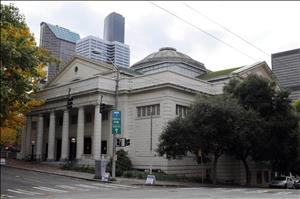On March 17, 1999, Seattle's Town Hall is launched with a free celebration of "Seattle's Favorite Poems," hosted by Robert Pinsky (b. 1940), poet laureate of the United States. As a warm-up for the event, The Seattle Times prints several favorite poems in its March 15, 1999, edition. At the Town Hall debut, local luminaries including Tom Skerritt, Speight Jenkins, Rick Rapport, Hazel Wolf (1898-2000), Mike Lowry (1939-2017), Charles Royer (b. 1939), and third-graders Sophie Posnock and Madeline Boardman read their favorite poems.
New Venue for the City
The Town Hall project began in the 1980s when David C. Brewster (b. 1939) and a group of his friends had the idea of converting an older building for use as a music-performance venue and community center. They were looking for a mid-sized building in good repair, centrally located, with excellent acoustics and adequate parking. By 1990, the Fourth Church of Christ Scientist, located at 8th Avenue and Seneca Street on First Hill just east of downtown, was targeted as the best potential location.
After seven years, seven offers, and long-running negotiations with the City of Seattle, the Town Hall Project and the church reached a preliminary agreement. The church was ready to sell, but the Town Hall Project wasn't quite ready to buy. The Historic Seattle Preservation and Development Authority stepped into the breach and offered to complete the purchase. Emergency grants from the King County Arts Commission and the King County Landmarks and Heritage Commission made the purchase possible. A feasibility study was completed by a team of experts, led by Bassetti Architects. The church, aware of the concerns of the surrounding community and the desire to save the building, accepted a somewhat lower offer from Historic Seattle.
Brewster first organized a for-profit limited liability company (LLC) to purchase the building from Historic Seattle, and "the $1.6 million building was acquired through the personal investments of 17 civic-minded residents, ranging in amounts from $25,000 to $300.00" ("Town Hall: A Case Study"). Subsequently, a nonprofit, Town Hall Associates, completed the purchase of the building and took over its management.
What Happens at Town Hall?
Town Hall utilizes two levels of the building for its presentations: the original "basement" (the church's old Sunday-school room), with an entrance on Seneca Street; and the Great Hall, which was the former sanctuary of the church. The Great Hall is located on the second floor under the building's dome and seats 900, with the main entrance on 8th Avenue. On occasion, events are presented at both locations simultaneously.
On any given day, Town Hall may be presenting a performing-arts event and/or civic lectures, debates, or celebrations. Programming designed specifically for children and families is also featured. Town Hall has come to take the place of, and improve upon, the old Civic Auditorium, which is now McCaw Hall at the Seattle Center, home to the Pacific Northwest Ballet and Seattle Opera companies.
Although there has been extensive renovation done at Town Hall, most of it is not obvious to the visitor, and the building looks much as it did in the past. Even the pews in the Great Hall were retained, by popular request. However, the church's pipe organ, an historic Austin "American Romantic," has not been refurbished.
During the 2010-2011 season, for example, Town Hall hosted 389 events and drew more than 105,000 attendees. As reported to the Seattle Foundation in September of 2011, highlights of the season included:
- A second annual free, outdoor "Share the Music" concert
- Joshua Roman's sold-out TownMusic performance of all six Bach Cello Suites
- A celebration of Global Rhythms' 20th year (and its retiring curator, Spider Kedelsky)
- A sold-out event with the sound artist, Trimpin
- Live broadcasts of KUOW's "Weekday" with Sherman Alexie and Nancy Pearl
- Events with local luminaries, including Paul Allen and Dan Savage
- Development of a new collaborative series by the University of Washington entitled "Science Now"
- An Institute for Systems Biology lecture, "Science in Society"
- A co-presentation of "The Ecstasy of Influence," honoring Heather McHugh, with City Arts
- Numerous Saturday Family Concerts performances
Town Hall is rarely "dark." When former executive director Wier Harman died in December 2023, The Seattle Times wrote that "When Harman stepped down in late 2022, after stewarding Town Hall through a $35 million building renovation campaign and also a pandemic, the organization’s annual number of events topped 400 and membership had grown to 4,000 strong. Harman was especially proud ... to have attracted a younger audience to Town Hall, and made the venue more affordable, inclusive and accessible" ("Wier Harman, Former Town Hall ...").

